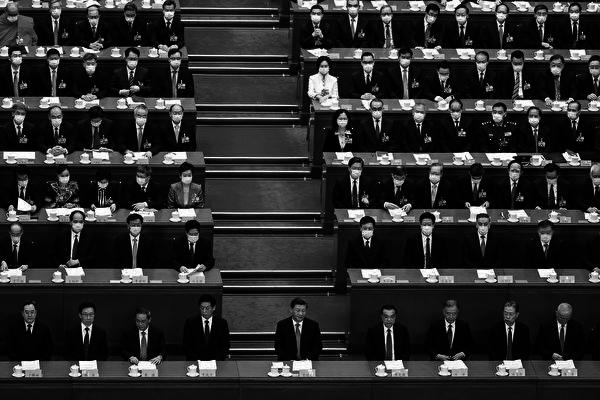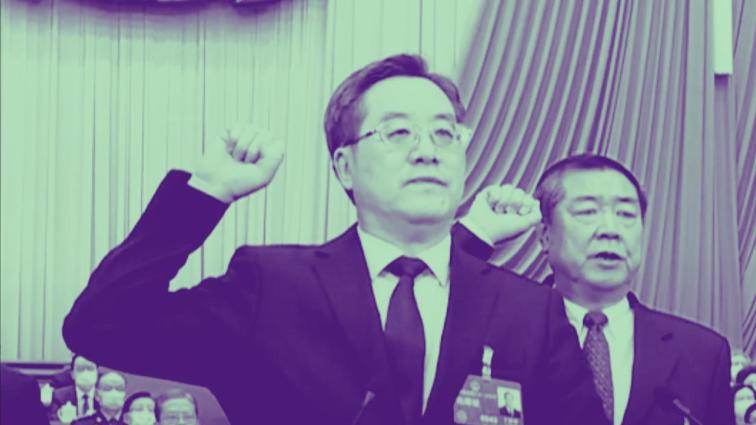March 10, 2025, Beijing Great Hall of the People—A security guard stands at the entrance before the closing ceremony of the Chinese People's Political Consultative Conference. (WANG ZHAO/AFP via Getty Images)
[People News] According to reports from mainland state media on July 11, Xi Jinping recently responded to a letter from eight artists, including Tian Hua, expressing his high hopes for filmmakers. The existence of a reply indicates that there was an incoming letter. The individuals who wrote to Xi are several veteran film actors: Tian Hua, Wang Xingang, Zhang Liang, Tao Yuling, Xiao Guiyun, Pan Hong, Song Zuying, and Chen Daoming. Their letter aimed to "report on their experiences and insights from decades in the film industry and express their determination to contribute to the development of the film sector and the establishment of a culturally strong nation."
This situation is quite peculiar; there is no commemorative occasion or special celebration. Why did these veteran actors suddenly feel the need to write to the top party leader to express their commitment? After all, such platitudes are not particularly original. Is the intent behind the letter simply to give Xi an opportunity to respond and maintain their visibility in the media?
I suspect that the only way to bring these eight individuals together to write this letter must have originated from higher authorities, possibly even directives from the Politburo of the Communist Party of China. It is likely that an official draft was already prepared for them, requiring only their agreement and signatures. Such practices are not uncommon within the Communist Party's propaganda apparatus. Furthermore, even if some of the eight were reluctant, under political pressure, they would have little choice but to comply.
Interestingly, when state media reported on the responses from Xi (Xí) and the reactions of filmmakers, only three of the eight individuals mentioned in the letter—Tian Hua (Tián Huá), Pan Hong (Pān Hóng), and Chen Daoming (Chén Dàomíng)—offered a few polite remarks, while others, including Wang Xingang (Wáng Xīngāng), did not respond at all. Is this yet another oddity? This indirectly suggests that regarding the 'writing of letters' under directives, these actors, who are somewhat aware of the internal workings of the Chinese Communist Party (CCP), are not acting of their own free will; they are compelled to allow the CCP to use their reputations, yet they are also hesitant to express too much.
Examining Xi's reply, it is noted that over the past decade, he has been responding to various letters from Chinese citizens as needed each year. It is highly likely that both the letters and the responses are orchestrated. The author compared Xi's replies to Tian Hua and others with his replies to others in 2025, 2024, and 2023, and discovered a curious trend: the secretary from the General Office who writes replies for Xi may have changed, or there are new directives in place.
In the reply to Tian Hua and others, Xi immediately got to the point after the salutation, stating, 'Upon seeing everyone's letters, I couldn't help but think of...'. However, in the replies from 2024 and 2023, there would typically be a polite greeting after the salutation, such as 'Hello to you all', followed by a mention of 'the letter has been received', before entering the main text to express encouragement, hope, and well-wishes.
In the 2025 reply, this absence of greeting is not an isolated case. For example, on June 29, Xi's reply to all the residents of Gala Village in Linzhi Town, Bayi District, Tibet, followed the same pattern, beginning with 'Upon seeing the letter, I was reminded of four years ago...'.
On May 3, Xi Jinping responded to all members of the volunteer service team for the border education support program at Xieyite Primary School in Hala Jun Township, Atushi City, Xinjiang, stating, 'Your letter has been received' without any greeting following the salutation. This was similar to his reply on January 10 to the young artists at the National Peking Opera Theatre.
In contrast, Xi's replies in 2024 and 2023 were notably more courteous. For example, in his reply on October 25, 2024, to all faculty and students of Ocean University of China, on October 17 to the student representatives of the China International University Innovation Competition, on October 10 to the representatives of the 'Silver Age Action' elderly volunteers, on September 28 to the representatives of industrial workers from China First Heavy Industries, on September 26 to all faculty and students of Communication University of China, on September 26 to the descendants of the representatives who pledged at the Pu'er National Unity Oath Monument, on August 14 to environmental volunteers in the Danjiangkou Reservoir area of Shiyan, Hubei, on August 1 to Hong Kong entrepreneurs with ancestral roots in Ningbo, on June 12 to Chinese Academy of Sciences academician and Tsinghua University professor Yao Qizhi, and on May 15 to the villagers at the foot of the Badaling Great Wall in Beijing, he addressed them with 'Hello! Your letter has been received (or I have received your letter)'.
The only exception was his reply on May 31 to the students of Zhi Jiang Primary School in Jialing District, Nanchong City, Sichuan Province, where he began with 'Hello! Upon seeing your letter, I recalled...'.
Let’s take another look at the replies from 2023. On September 29, Xi Jinping responded to the children of martyrs studying at the People's Public Security University of China; on September 16, he addressed all faculty and students at Northeast University; on September 12, he replied to all customs officers at the Hongqilafu Customs; on July 25, he responded to all first-year students at Hong Kong Pui Kiu Middle School; on July 21, he replied to representatives of academicians and experts from 'Science and China'; on July 5, he addressed international students in the master's program in auditing at Nanjing Audit University; on May 24, he replied to faculty and students at the University of Science and Technology of Macau; on May 23, he responded to the veteran experts and artists at the National Art Museum of China; on May 3, he replied to students at the Agricultural University of China’s Science and Technology Academy; and on February 10, he addressed members of the China-Africa medical team, always starting with 'Hello! Your letter has been received (or the letter has been received)'.
The only exceptions were on September 2, when Xi replied to the workers of the 'Li Zhiqiang Class' at the China Aviation Engine Corporation's assembly plant, and on May 22, when he responded to the garbage classification volunteers in the Jiangxing Road Street of Hongkou District, Shanghai, addressing them with 'Hello! Upon seeing your letter, I thought of...'.
It is evident that the replies over the past two years have been more courteous and aligned with Chinese customs. So, why did the replies in 2025 suddenly change? Specifically, they intentionally omitted the greetings, which seems to neglect the effort to maintain Xi's image.
One possible explanation is that the secretary from the General Office who replies on Xi's behalf has likely changed, which may be closely linked to the rumours of Xi's serious illness and loss of power that emerged last July. However, even if there has been a change, a carefully vetted secretary should still be aware of basic polite expressions.
Thus, another possible explanation is that the Central Office has received new directives from the authorities, specifically to intentionally eliminate the greeting 'Hello.' But what could be the rationale behind this? Is it a deliberate attempt to reveal vulnerabilities?
Whatever the reason may be, these changes warrant attention, as the details mirror the fluctuations within the internal political dynamics of the Chinese Communist Party.△
(First published by People News)











News magazine bootstrap themes!
I like this themes, fast loading and look profesional
Thank you Carlos!
You're welcome!
Please support me with give positive rating!
Yes Sure!